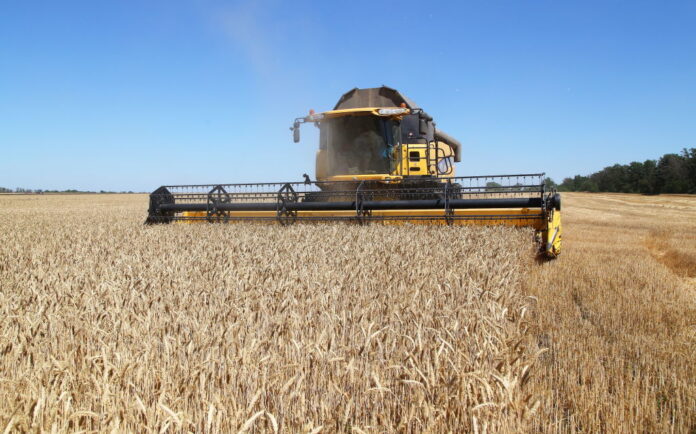Russia‘s invasion of Ukraine is already turning up the heat on commodity prices like wheat and oil, with experts saying a prolonged conflict could have a significant impact on food price inflation in Canada.
Russian attacks forced Ukraine to shut down its commercial shipping port Thursday, affecting the country’s major grain exports. Ukraine ships corn and barley to global buyers and also competes with Russia as a major wheat exporter in the continent.
Together, the two countries account for 29 per cent of global wheat production, according to Reuters.
Markets have already taken notice of the potential for Russia’s unprecedented act of aggression to disrupt food supply chains.
Futures prices for wheat spiked as high as US$9.30 a bushel on Thursday, setting a nine-year record.
“Ukraine is Europe’s breadbasket,” says Sylvain Charlebois, director of the Agri-Food Analytics Lab at the University of Dalhousie.
With oil prices meanwhile up over US$100 a barrel, Canada’s grocery sector is about to get hit hard as costs rise on commodities and transportation, Charlebois tells Global News.
“We do have a trucking economy in North America, so that’s going to be problematic… (it will) obviously will make our food inflation situation much worse in the western world and also in Canada,” he says.
Pressure on grain products might hit the bakery first, but Charlebois says costs will soon be passed on to other aisles in the grocery store as feed for livestock becomes more expensive and prices on meat, dairy and eggs rise in turn.
While Canada’s annual rate of inflation hit 5.1 per cent last month — its highest level in more than 30 years — the Agri-Food Lab pegs inflation on food specifically at 6.5 per cent. Charlebois says the lab was already forecasting that rate to hit seven per cent this year, though the latest events in eastern Europe are now likely to push food inflation past that mark.
“What this conflict will do is bring a new layer of uncertainty and that will impact how companies negotiate prices, how they plan and things like that,” he says.
Global News Morning Mark and Business Report – Feb. 24, 2022
While prices are likely to be affected, Canadians’ access to bread products is likely secure, Charlebois says — moreso than European countries relying more heavily on Ukraine.
Trending Stories
Medicago’s Canada-made COVID-19 vaccine approved by Health Canada
Canada has a sizeable domestic agriculture industry, relying on little if any grain products from eastern Europe, says Dave Quist, director of the Western Canadian Wheat Growers, a lobby group representing producers in prairie provinces.
While the rising price of wheat could see farmers get more for their own exports, he says Canadian growers are facing their own setbacks that makes ramping up production difficult.
Firstly, given the production cycles for grain crops, most farmers have already placed their orders for seed and were making crop rotation plans back in the fall.
The industry has a brief window to adjust plans before planting begins in April, Quist says, but it’s still short notice to drastically increase crop yields to offset potential shortfalls in Europe.
“There’s very little ground sitting fallow that is not being used right now,” Quist notes.
Farmers are also still dealing with the supply chain impacts related to COVID-19 that have plagued a variety of industries across the world for months.
Short Supply: How the supply-chain crunch is affecting consumers – Oct 26, 2021
Many producers are struggling to get machinery in their fields, as the semiconductor and parts shortages that have seen delays in new car shipments have also hit tractors and other farm equipment.
Fertilizer is the other missing piece — delays at biopharmaceutical firm Bayer are currently having “repercussions across the industry,” Quist says.
Charlebois notes that Belarus and Ukraine are also hubs for fertilizer production, so further disruptions are only going to make sourcing the key agricultural input more expensive for Canadian farmers.
“The global food supply chain is still a mess. We’re still trying to figure out how normalcy will look on the other side of the pandemic,” Charlebois says.
Quist says that other major wheat exporters such as Australia and Argentina had bumper crops this past season and are likely to keep product flowing globally through the summer. Disruptions in Ukraine, he predicts, will start to hit other regions come the fall.
While the Bank of Canada is set to make an interest rate announcement next week as part of its mandate to tamp down on soaring inflation, Charlebois notes that food and grocery bills — tied to globally set commodity prices — are largely out of policymakers’ hands.
The primary determinant in how high prices on wheat and other products go could be the ultimate length of Russia’s invasion.
“We don’t know how long this conflict is going to last,” Charlebois says. “But the longer it lasts, the more companies will have to revisit their procurement strategy and how they price their products towards their customers.”
— with files from Reuters
Russia-Ukraine conflict: Canada imposes severe new sanctions on Russia
© 2022 Global News, a division of Corus Entertainment Inc.



